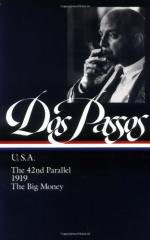
|
| Name: _________________________ | Period: ___________________ |
This test consists of 5 short answer questions, 10 short essay questions, and 1 (of 3) essay topics.
Short Answer Questions
1. Who is the nephew of one of the directors at Ward's new job with whom he socializes?
2. When Eleanor changes residences, who is her wealthy new friend?
3. Where does Joe take his date to see a show in pages 257-282?
4. What does Charley do with the pills?
5. When the play closes after two weeks, what does Eleanor and Eveline fail to receive?
Short Essay Questions
1. Why does Janey quit her job and look for new work?
2. What does Mac do when the Zapata arrives in Mexico City?
3. What happens that makes Janey feel that she has made the "big time" at work?
4. What does Charley do for work in Minneapolis when he moves there?
5. What happens when Ward accepts the job from McGill?
6. What does Ward want in his line of work, and how does he achieve it?
7. What effect does Annabelle's decision to terminate her pregnancy have on Ward?
8. How does Janey change when she lives in New York?
9. What does Eleanor do to conceal her upbringing?
10. Why is Charley eager to leave Fargo?
Essay Topics
Write an essay for ONE of the following topics:
Essay Topic 1
Describe some of the settings for the stories in the 42nd Parallel. What is the overall setting? Be sure to include geography, time period, and any pertinent popular culture events. Why did the author choose to use these places in the stories of the 42nd Parallel?
Essay Topic 2
Politics play a significant role throughout the entire book. In the 42nd Parallel, John dos Passos asks and sometimes offers occasional answers to big philosophical questions about the role and rights of workers in society, the equality of men and women, and important figures of the early 20th century. Do you find John dos Passos' arguments convincing? Why or why not? Do any of his characters show strong political opinions and, if so, about what? Describe.
Essay Topic 3
Describe Eleanor. What is her role in the story? How does she compare with the other four main characters? What struggles must she overcome? What was the author trying to accomplish by creating Eleanor's character in the novel?
|
This section contains 933 words (approx. 4 pages at 300 words per page) |

|




